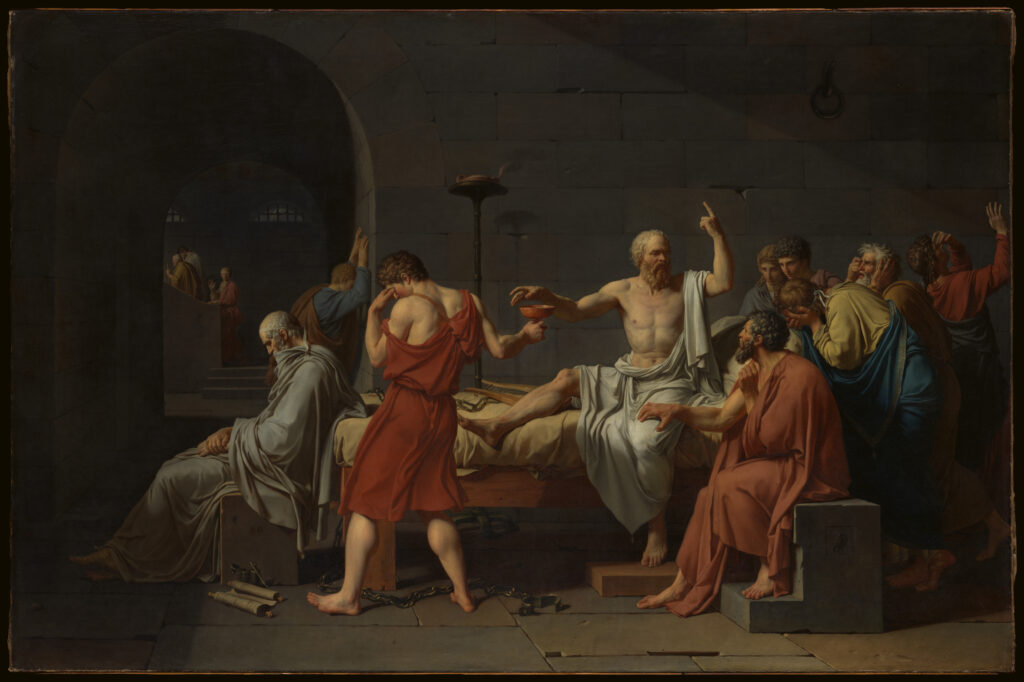
I took a couple of philosophy classes this year for the sole purpose of knowing how to argue well in a debate. I am hoping to become a lawyer, and since arguing and reasoning are essential to achieving my dream, philosophy seemed like a perfect fit for me. In Plato’s Republic, Socrates starts honest conversations with individuals and pushes their thinking further by using the Socratic method. I admire the way Socrates is able to argue well and isn’t afraid to speak up to his peers. He also responds to constructive criticism and pushes his fellow citizens to deeply refine their thoughts. I am hoping to master the Socratic method and the art of building strong arguments by learning the fundamental principles of philosophy. That way, I can gain the traits of being a rational and logical thinker to help make me a great lawyer. A critic might argue that a Political Science course will be more beneficial to study for law than a philosophy course. However, I find that both of these subjects are crucial to study. Political Science courses are important as they give an understanding of how the law and government work, but philosophy gives insight on how to reason and argue in an effective way.
Philosophers and lawyers are similar in many ways, and they both carry out similar skills, one being the art of persuasion. Being able to construct arguments on both sides of a case is imperative, and trying to persuade the judge and jury to take your side is crucial. Another skill that is valued when learning philosophy and law is to think on your feet when you get hit with a curveball. Being able to reply to objections in an effective manner is one of the many skills I hope to establish during my time studying philosophy. In addition, being able to make sense of abstract situations by breaking them down into smaller components is another skill I hope to foster throughout the course.
In Plato’s Republic, Socrates has a way of making sense of abstract situations by using all sorts of analogies. He makes sense of difficult situations by asking more questions to get the opposing counsel to think rationally and on their feet and then he proposes different types of analogies, trying to help the person understand the core of his statement. For example, in book one of Plato’s Republic, Socrates creates an analogy for Cephalus to help him understand why his definition of justice doesn’t work. Cephalus believes that justice is to follow all legal obligations and be truthful. The analogy Socrates creates is about a madman who has lost his weapon. Imagine giving a madman his weapon back after he loses it because it is the right thing to do and you will be following your legal obligation by doing so; yet, the madman could do an unjust act by harming innocent civilians as a result. The idea behind Socrates’s analogy is to showcase the hidden truth behind Cephalus’s abstract thought on justice, that justice is not about following the law, but doing what is fundamentally right.
Nothing is to be preferred before justice
socrates
Socrates’s way of making sense of complicated situations is similar to law. In the field of law, lawyers use the legal system to change unjust laws. When they encounter unjust laws, they then take their cases to the Supreme Court in the hopes of changing wrong or unjust laws. Therefore, it is clear to see how philosophy and law overlap with each other in terms of making sense of abstract situations and helping people learn how to reason and argue persuasively.
A criticism one might make regarding my choice to take philosophy is “why not take a Political Science course if law is ultimately the profession you want to go into?” Although Political Science is one of the many fundamental courses to take for law, it’s important to first be able to know how to make strong arguments before actually learning about the principles of law. When making laws, lawyers first look at philosophical thinking in order to make sound laws. Having this in mind, I spent the past summer reading Plato’s Republic and found it captivating. It was intriguing to read how persuasive Socrates was when giving responses to an argument on certain topics without any hesitation; having that trait essentially makes great lawyers great. I find that having that foundational trait of being able to defend yourself when being put on the spot in certain situations is a skill that can be gained through learning philosophy. Now, don’t get me wrong, I will be taking a Political Science course somewhere in the future as it is an important course to take when becoming a lawyer. However, philosophy is equally as important as Political Science. Without the use of one or the other, a great lawyer cannot be great. It’s important to know how to reason and argue as well as understand the way law and government systems function in a given society.
I am hoping that by taking philosophy and by studying Socrates, I can foster a few key traits, namely: the art of persuasion, being able to think on my feet critically, and making sense of abstract situations.
